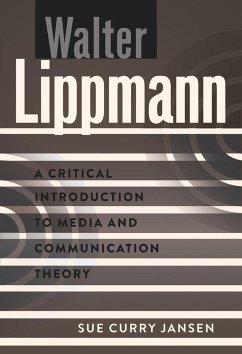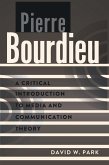Walter Lippmann has been widely misrepresented in media and communication scholarship. Classified as a utilitarian and characterized as an antidemocratic adversary of philosopher John Dewey in a legendary debate in the 1920s about the role of the public in modern democracies, Lippmann has been portrayed as the bête noir of the post-1980s revival of pragmatism and humanistic studies within the field. Consequently, his formative contributions to the field have not only been under-valued, but more importantly, the richness and continuing relevance of his generative work to the challenges of the twenty-first century are largely under-appreciated.
There are, however, some recent signs of the beginnings of a Lippmann renaissance. Focusing primarily on his early career when Lippmann directly addressed the challenges posed to democracy by the emergence of new communication technologies, this book is part of that renaissance. It presents a radical reconsideration of Lippmann's thoughtand legacy and offers a broad-based introduction to his theories of mass communication.
Arguing that he was a political ally rather than an adversary of Dewey as well as a humanist and a democrat, influenced by William James' pragmatism and George Santayana's critical realism, Jansen contends that Lippmann developed a fully formed social constructivism decades before Peter L. Berger and Thomas Luckman's seminal 1966 treatise, The Social Construction of Reality. She boldly concludes that Lippmann deserves to be recognized as a founder of the field of media and communication research.
There are, however, some recent signs of the beginnings of a Lippmann renaissance. Focusing primarily on his early career when Lippmann directly addressed the challenges posed to democracy by the emergence of new communication technologies, this book is part of that renaissance. It presents a radical reconsideration of Lippmann's thoughtand legacy and offers a broad-based introduction to his theories of mass communication.
Arguing that he was a political ally rather than an adversary of Dewey as well as a humanist and a democrat, influenced by William James' pragmatism and George Santayana's critical realism, Jansen contends that Lippmann developed a fully formed social constructivism decades before Peter L. Berger and Thomas Luckman's seminal 1966 treatise, The Social Construction of Reality. She boldly concludes that Lippmann deserves to be recognized as a founder of the field of media and communication research.
«Very recently, in essays by Dave Tell and Nathan Crick, rhetoricians have begun to revisit Lippmann, joining Michael Schudson and Bruno Latour, among others, in reevaluating his worth. Jansen's book is the most sustained of these efforts and an excellent (re)introduction for students and scholars alike.»
(Peter Simonson, Rhetoric & Public Affairs 19.3/2016)
(Peter Simonson, Rhetoric & Public Affairs 19.3/2016)









